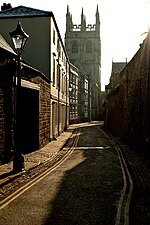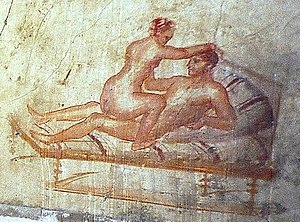Portal:Prostitution
Introduction
Prostitution is the business or practice of engaging in sexual activity in exchange for payment. The definition of "sexual activity" varies, and is often defined as an activity requiring physical contact (e.g., sexual intercourse, non-penetrative sex, manual sex, oral sex, etc.) with the customer. The requirement of physical contact also creates the risk of transferring infections. Prostitution is sometimes described as sexual services, commercial sex or, colloquially, hooking. It is sometimes referred to euphemistically as "the world's oldest profession" in the English-speaking world. A person who works in the field is usually called a prostitute or sex worker, but other words, such as hooker, putana, or whore, are sometimes used pejoratively to refer to those who work as prostitutes.
Prostitution occurs in a variety of forms, and its legal status varies from country to country (sometimes from region to region within a given country), ranging from being an enforced or unenforced crime, to unregulated, to a regulated profession. It is one branch of the sex industry, along with pornography, stripping, and erotic dancing. Brothels are establishments specifically dedicated to prostitution. In escort prostitution, the act may take place at the client's residence or hotel room (referred to as out-call), or at the escort's residence or a hotel room rented for the occasion by the escort (in-call). Another form is street prostitution.
According to a 2011 report by Fondation Scelles there are about 42 million prostitutes in the world, living all over the world (though most of Central Asia, the Middle East and Africa lack data, studied countries in that large region rank as top sex tourism destinations). Estimates place the annual revenue generated by prostitution worldwide to be over $100 billion. (Full article...)
Selected article

Gropecunt Lane /ˈɡroʊpkʌnt ˈleɪn/ was a street name found in English towns and cities during the Middle Ages, believed to be a reference to the prostitution centred on those areas; it was normal practice for a medieval street name to reflect the street's function or the economic activity taking place within it. Gropecunt, the earliest known use of which is in about 1230, appears to have been derived as a compound of the words grope and cunt. Streets with that name were often in the busiest parts of medieval towns and cities, and at least one appears to have been an important thoroughfare.
Although the name was once common throughout England, changes in attitude resulted in its replacement by more innocuous versions such as Grape Lane. A variation of Gropecunt was last recorded as a street name in 1561. (read more ...)
![]() Wikipedia Featured Article
Wikipedia Featured Article
Selected biography

Belle Cora (1827? –1862), also known as Arabella Ryan, was a successful Madam of the Barbary Coast during the mid-nineteenth century. She rose to public attention in 1855 when her lover, Charles Cora, killed US Marshall William H. Richardson. The fight between Charles and Richardson started at the American Theatre. Richardson's wife complained that Belle Cora, a well-known parlor house owner, and Charles Cora, a frequent gambler were seated in the same balcony as her. She stated that they should be in the general admission pit seats rather than the more expensive areas reserved for more respectable guests. As a result, Richardson went to ask the manager of the theatre to remove the couple, but the manager refused saying that they were regular customers of the first balcony. (read more...)
Did you know?

- ...that Ida Dorsey built the last standing bordello (pictured) from Minneapolis' three red-light districts?
- ...that Amsterdam's Prostitution Information Center provides the city's visitors with information and advice about prostitution?
- ...that because of an effort to curb the spread of sexually transmitted diseases, prostitution in Germany has been legal since the 1920s?
- ...that the chrysargyron tax forced some Byzantine families to sell their children into slavery and prostitution?
Quotes
| “ | On the evening of the last day of October, 1501, Cesare Borgia arranged a banquet in his chambers in the Vatican with "fifty honest prostitutes", called courtesans, who danced after dinner with the attendants and others who were present, at first in their garments, then naked. | ” |
Anniversaries - May
- 9th
- 1914: Birth of Denham Fouts, an American male prostitute, socialite and literary muse. He served as the inspiration for characters by Truman Capote, Gore Vidal, Christopher Isherwood and Gavin Lambert.
- 14th
- 1973: Death of Dorothy Baker, also known as Big Dorothy, an American madam in Helena, Montana.
- 26th
- 1956: The Prostitution Prevention Law, which outlawed Prostitution in Japan, was passed by Japan's National Diet
- 27th
- 1835: Birth of Anna Wilson, a pioneer madam in Omaha, Nebraska. When she died she bequeathed her life savings to the City of Omaha, along with her 25-room mansion brothel, which was used as a hospital.
- 1951: Birth of Norma Jean Almodovar, American author and sex workers activist.
- 28th
- 1905: Birth of Sada Abe, a Japanese geisha and prostitute, who erotically asphyxiated her lover and then cut off his penis and testicles and carried them around with her in her kimono.
- 30th
- 1949: The government-run brothel, Campo Alegre, opened in the Dutch Caribbean island of Curaçao in an attempt to concentrate prostitution in one location on the island.
Selected image
Legality Map

Subcategories
Related portals
Need help?

Do you have a question about Portal:Prostitution to which you can't find the answer?
Consider asking it at the Wikipedia reference desk.
Get involved

For editor resources and to collaborate with other editors on improving Wikipedia's Portal:Prostitution-related articles, see WikiProject Sexology and sexuality/Sex work task force.
 Here are some tasks you can do:
Here are some tasks you can do:
- Start a new article. Prostitution is a broad topic, so there will always be plenty of missing articles.
- Clean up existing articles. A lists of articles needing cleanup is available here.
- Expand an existing article. Existing articles are often incomplete and missing information on key aspects of the topic. Stubs can be found in Category:Stub-Class Sex work articles.
- Discuss. Get involved in discussions on prostitution related articles, a current listing is available here
- Improve main article prostitution to featured status.
- Suggest improvements to this portal here
Recognised content
 Featured (13)
Featured (13)
 Good (18)
Good (18)
- Mah Laqa Bai
- Butters' Bottom Bitch
- Child prostitution
- Elizabeth Cresswell
- Casey Donovan
- Dumas Brothel
- Andrea Dworkin
- Natasha Falle
- Kanhopatra
- Caroline Lacroix
- Ipswich serial murders
- National Action Plan to Combat Human Trafficking
- Neaira (hetaera)
- Salon Kitty
- She Has a Name
- Soho
- Valerie Solanas
- Three Sisters Tavern
Subtopics
Associated Wikimedia
The following Wikimedia Foundation sister projects provide more on this subject:
-
Commons
Free media repository -
Wikibooks
Free textbooks and manuals -
Wikidata
Free knowledge base -
Wikinews
Free-content news -
Wikiquote
Collection of quotations -
Wikisource
Free-content library -
Wikiversity
Free learning tools -
Wiktionary
Dictionary and thesaurus























